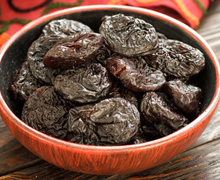
Prunes are a popular choice among older people looking to add more fiber to their diet but new research shows they are also good for bone health. Scientists at Penn State University found prunes were able to slow the progression of age-related bone loss and reduce the risk of fracture in a study of postmenopausal women.
Bones are constantly in a process of remodeling and old bone is replaced by new tissue. But as the body ages the bone can break down faster than it can be rebuilt.
Accelerated bone loss can lead to a condition called osteoporosis, which is a disease where bones become less dense and more susceptible to fracture. There are an estimated 10 million Americans who have osteoporosis. It is more common in women than men and postmenopausal women are more likely to get it because the loss of estrogen that is prevalent after menopause accelerates the loss of bone density.
Prunes are considered a promising alternative to medication for osteoporosis according to researcher Mary Jane De Souza, distinguished professor of kinesiology and physiology at Penn State. She said they contain bioactive compounds like polyphenols that help with inflammation that can also contribute to bone loss.
"This is the first randomized controlled trial to look at three-dimensional bone outcomes with respect to bone structure, geometry and estimated strength," said "In our study we saw that daily prune consumption impacted factors related to fracture risk. That's clinically invaluable."
DeSouza said previous studies used dual energy X-ray absorptiometry (DXA) to evaluate bone density and diagnose osteoporosis in two dimensions. She said a three-dimensional look is better.
"When we look at bone mineral density, we're looking at how much bone there is, but we also want to know about the quality of the bone," De Souza said. "When we look at a three-dimensional picture, we can look at bone structure, geometry and micro-architecture. In other words, it tells us how good the bone is."
The 12-month randomized controlled trial involved 235 postmenopausal women who were assigned to one of three groups. One had no prunes. One ate 50 grams, which is 4-6 prunes per day. The final group was asked to eat 100 grams, which is 10-12 prunes per day.
They were evaluated every six months with a 3D bone scan. Researchers found those in the control group who had no prunes had a decrease in bone mass and strength in the tibia (shin bone). At the same time, those who ate at least 4-6 prunes each day maintained bone density and bone strength and preserved bone structure. The 4-6 number seemed right for researchers who said more people in the 10-12 group dropped out because it was hard for them to keep up with the task of eating that many prunes each day.
"It's pretty exciting data for a 12-month study," De Souza said. "We were able to maintain and preserve bone at the weight-bearing, cortical bone of the tibia and the maintenance of cortical bone and bone strength is key to avoiding fracture."
Click here to read more in the journal Osteoporosis International.
